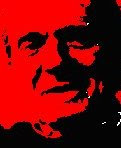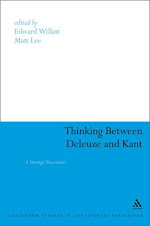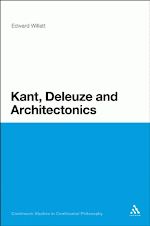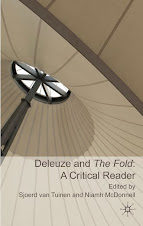7 JULY 2007 Timetable and Abstracts
'The Strange Encounter of Kant and Deleuze'
Saturday July 7th, Greenwich University, Maritime Campus, Old Royal Naval College, London: 10am - 5pm
Saturday July 7th, Greenwich University, Maritime Campus, Old Royal Naval College, London: 10am - 5pm
'My book on Kant is different, I like it very much, I wrote it as a book on an enemy, in it I was trying to show how he works, what his mechanisms are...'
Gilles Deleuze, Letter to Michele Cressole
'Our age is properly the age of critique, and to critique everything must submit.'
Immanuel Kant, Critique of Pure Reason
This conference aims to explore and dramatise the conceptual relations that exist between Gilles Deleuze and Immanuel Kant. Deleuze offers us a 'transcendental empiricism' in direct contrast to Kants' 'transcendental idealism' and the combination of their common ground and their stark oppositions makes this a particularly fertile realm of thought. There has been a growing recognition of the importance of the connections between Deleuze and Kant and this conference aims for the first time to place these relations centre stage. We are strongly encouraging both Deleuzian and Kantian scholars to come together in a constructive encounter that has critical importance for the wider philosophical community.

Timetable
10-10.30
Registration – Room Queen Anne 080 (all the session take place in Queen Anne Court)
10.30-12.00
Parallel Sessions
1. QA38
Joanna Hodge (Manchester Metropolitan)
‘Deleuze, Husserl, Kant: Transcendental Intermediaries ’
2. QA39
Edward Willatt (Greenwich) ‘Reason, Desire and Incompleteness in Deleuze’s Reading of Kant’
10-10.30
Registration – Room Queen Anne 080 (all the session take place in Queen Anne Court)
10.30-12.00
Parallel Sessions
1. QA38
Joanna Hodge (Manchester Metropolitan)
‘Deleuze, Husserl, Kant: Transcendental Intermediaries ’
2. QA39
Edward Willatt (Greenwich) ‘Reason, Desire and Incompleteness in Deleuze’s Reading of Kant’
12.00-1.00
Lunch (not provided – there are cafes and shops in Greenwich town centre which is close to the campus and the Cutty Sark DLR station).
1.00-2.30
Parallel Sessions
1. QA 38
Matthew Hammond (Exeter) ‘Picking over the Bones of David Hume’
2. QA 39
Filipe P. Ferreira (New School for Social Research)
‘Bergsonism and Critique’
3.00-5.00
Keynote Session – The strange encounter...
QA 080
Daniel W. Smith (Middlesex/Purdue) ‘Deleuze, Kant, and the Post-Kantian Tradition’
Paul Davies (Sussex) ‘Regulating and Inventing Concepts’
Lunch (not provided – there are cafes and shops in Greenwich town centre which is close to the campus and the Cutty Sark DLR station).
1.00-2.30
Parallel Sessions
1. QA 38
Matthew Hammond (Exeter) ‘Picking over the Bones of David Hume’
2. QA 39
Filipe P. Ferreira (New School for Social Research)
‘Bergsonism and Critique’
3.00-5.00
Keynote Session – The strange encounter...
QA 080
Daniel W. Smith (Middlesex/Purdue) ‘Deleuze, Kant, and the Post-Kantian Tradition’
Paul Davies (Sussex) ‘Regulating and Inventing Concepts’

Abstracts
1. Joanna Hodge (Manchester Metropolitan): ‘Deleuze, Husserl, Kant: Transcendental Intermediaries’
This paper consists in an exploration of two claims and an emergent problem about how to think the relation between reading texts signed by Deleuze and pursuing the task of inventing concepts. The puzzle about how to think the relation between Difference and Repetition and The Logic of Sense is set out clearly already by Michel Foucault, in his early response to their publication, in 1970, printed under the title “Theatrum Philosophicum”. My first claim is that this relation will continue to be obscure until and unless the full dimensions of Deleuze’s encounter with Husserl are taken into account, and my longer term ambition, not to be fulfilled here, is to follow through the thinking occasioned by such an encounter. I shall, however, adduce some remarks to indicate why this follow through should be undertaken. Its result would be the conversion of this claim from an interpretative hermeneutical claim into claim about the invention of concepts, which itself would take the form of conceptual invention. My second claim is that there is no sense for Deleuze of some cumulative development and improvement in philosophy, asrealising some teleological process. There is thus no place within Deleuzian accounts of invention for a Husserlian notion of a fulfilment or dereliction with respect to a task uniquely assigned to human beings, to realise rationality. This sets out a separationbetween lines of an encounter between Deleuze and Husserl, and opens out of a gap between a Deleuzian Husserl and the figure more usually construed, as committed to a system of 'ideas in the kantian sense'.
2. Edward Willatt (Greenwich): ‘Reason, Desire and Incompleteness in Deleuze’s Reading of Kant’
Deleuze's reading of Kant offers us an account of his system and of the points at which it is most productive. We find such an account in Deleuze's 1963 book 'Kant's Critical Philosophy'. In this paper I will focus upon this text in order to draw out his insights into the relation of the faculties of reason and understanding. I will seek to show that as well as offering an explanatory account of Kant's system in this text Deleuze also seeks to make it productive within his own thought, anticipating his use of Kant in later work. The account of cognition and its advance given in the 'Critique of Pure Reason' involves reason and its desires, along with a host of characters including the dogmatist and the sceptic. I will seek to relate the activity of the faculties in dealing with appearances to Deleuze's notion of the ‘problem-question complex’. I want to suggest that Deleuze finds the unity of cognition to be open and dynamic in Kant when he develops the role of reason's desires in the problems and questions that occupy the faculties and sustain their activity. This is taken further when Deleuze employs the notion of the ‘object=x’ in his reading of structuralism. I aim to conclude that Kant's account of cognition and its advance as a whole engage Deleuze productively in 'Kant’s Critical Philosophy' and beyond.
3. Filipe P. Ferreira (New School for Social Research): ‘Bergsonism and Critique’
We turn to Bergson, asking him for the body without organs. We find that he responds, that the body he thinks in Matter and Memory gives us a trajectory for stating this body as a problem. It is this question, the one which problematizes this body, that sets our investigation. As we continue, we find with Bergson that this body involves as its condition the astounding thesis that perception, as action, antecedes affection. In developing this thesis, we compose Bergson’s sophisticated account of the human body as a body without affection, without consciousness, a body which perceives and acts. In our desire to further problematize this body, we ask Bergson for this condition, for the difference in kind between perception and affection. He responds in the inverse direction, using this body, an accomplishment which seems to me a central contribution to contemporary philosophy, to restate further philosophical problems. That is, he uses this body as a condition for the unfolding of his philosophy. We associate here the statement of this body as a problem with the question of the genesis of Bergsonism. We also ask whether, in problematizing this body as the genesis of Bergsonism, and given its principal evolution, the project of a superior empiricism, we can develop insight, by making it ours the question of the genesis of this body, into this project. But how to proceed with this body, inquire into its genesis? At this point we know one its conditions: that this body is discovered in thinking perception as prior to affection. But how are we to inquire further? It is here that our discussion turns to Kant’s Critique of Pure Reason. Following a hint in Matter and Memory, we find Bergson describing how it is that Kant does not follow in the direction of this body. We find that it is a problem of sensibility, of how Kant, for Bergson, uses his ‘magician’s wand’ to create representations from sensible conditions which he entirely dismisses. We have our second horizon: that which does not allow Kant to follow are these sensible conditions. But how are we to problematize these conditions without simply returning to the statement of the Bergson’s first accomplishment, his theory of pure perception? We then proceed to set up our discussion. We turn to Bergson’s images, and notice that they presuppose an unlimited totality, where the question for this philosopher is one of how, from this totality, perception is limited to our interest. We note that it is because one of these images is privileged, our body. In taking the question of limitation to the Critique of Pure Reason we find it is thought in the ‘Ideal of Pure Reason’, which discusses the ideal of complete determination of reality presupposed by the transcendental ideas. We then ask how Kant limits this total reality; we find that his Critique is directed to this unconditioned totality, that it is the limitation of this ideal of complete determination which will make this ideal beyond, beyond the possibility of experience and that which it presupposes: the determinable as the forms of intuition. Here we find a second condition for this body without organs: that the plane of pure determination be posited as such, where, in thinking the limitation to ideal determination, we think within the ideal, immanently to the ideal: it is the plane of immanence as a further condition for thinking the body without organs.
4. Matthew Hammond (Exeter): ‘Picking over the Bones of David Hume’
2. Edward Willatt (Greenwich): ‘Reason, Desire and Incompleteness in Deleuze’s Reading of Kant’
Deleuze's reading of Kant offers us an account of his system and of the points at which it is most productive. We find such an account in Deleuze's 1963 book 'Kant's Critical Philosophy'. In this paper I will focus upon this text in order to draw out his insights into the relation of the faculties of reason and understanding. I will seek to show that as well as offering an explanatory account of Kant's system in this text Deleuze also seeks to make it productive within his own thought, anticipating his use of Kant in later work. The account of cognition and its advance given in the 'Critique of Pure Reason' involves reason and its desires, along with a host of characters including the dogmatist and the sceptic. I will seek to relate the activity of the faculties in dealing with appearances to Deleuze's notion of the ‘problem-question complex’. I want to suggest that Deleuze finds the unity of cognition to be open and dynamic in Kant when he develops the role of reason's desires in the problems and questions that occupy the faculties and sustain their activity. This is taken further when Deleuze employs the notion of the ‘object=x’ in his reading of structuralism. I aim to conclude that Kant's account of cognition and its advance as a whole engage Deleuze productively in 'Kant’s Critical Philosophy' and beyond.
3. Filipe P. Ferreira (New School for Social Research): ‘Bergsonism and Critique’
We turn to Bergson, asking him for the body without organs. We find that he responds, that the body he thinks in Matter and Memory gives us a trajectory for stating this body as a problem. It is this question, the one which problematizes this body, that sets our investigation. As we continue, we find with Bergson that this body involves as its condition the astounding thesis that perception, as action, antecedes affection. In developing this thesis, we compose Bergson’s sophisticated account of the human body as a body without affection, without consciousness, a body which perceives and acts. In our desire to further problematize this body, we ask Bergson for this condition, for the difference in kind between perception and affection. He responds in the inverse direction, using this body, an accomplishment which seems to me a central contribution to contemporary philosophy, to restate further philosophical problems. That is, he uses this body as a condition for the unfolding of his philosophy. We associate here the statement of this body as a problem with the question of the genesis of Bergsonism. We also ask whether, in problematizing this body as the genesis of Bergsonism, and given its principal evolution, the project of a superior empiricism, we can develop insight, by making it ours the question of the genesis of this body, into this project. But how to proceed with this body, inquire into its genesis? At this point we know one its conditions: that this body is discovered in thinking perception as prior to affection. But how are we to inquire further? It is here that our discussion turns to Kant’s Critique of Pure Reason. Following a hint in Matter and Memory, we find Bergson describing how it is that Kant does not follow in the direction of this body. We find that it is a problem of sensibility, of how Kant, for Bergson, uses his ‘magician’s wand’ to create representations from sensible conditions which he entirely dismisses. We have our second horizon: that which does not allow Kant to follow are these sensible conditions. But how are we to problematize these conditions without simply returning to the statement of the Bergson’s first accomplishment, his theory of pure perception? We then proceed to set up our discussion. We turn to Bergson’s images, and notice that they presuppose an unlimited totality, where the question for this philosopher is one of how, from this totality, perception is limited to our interest. We note that it is because one of these images is privileged, our body. In taking the question of limitation to the Critique of Pure Reason we find it is thought in the ‘Ideal of Pure Reason’, which discusses the ideal of complete determination of reality presupposed by the transcendental ideas. We then ask how Kant limits this total reality; we find that his Critique is directed to this unconditioned totality, that it is the limitation of this ideal of complete determination which will make this ideal beyond, beyond the possibility of experience and that which it presupposes: the determinable as the forms of intuition. Here we find a second condition for this body without organs: that the plane of pure determination be posited as such, where, in thinking the limitation to ideal determination, we think within the ideal, immanently to the ideal: it is the plane of immanence as a further condition for thinking the body without organs.
4. Matthew Hammond (Exeter): ‘Picking over the Bones of David Hume’
Towards the end of the First Critique, Kant praises Hume for ‘possibly’ having come up with a synthetic principle, but then failed to understand how that principle demanded that one move beyond the mere empirical repetition of conjoined presences, to form an idea of the agencies that make that conjoining necessary. Kant goes on to argue, that mere empirical repetition cannot found conjunctions, unless those conjunctions were themselves necessarily grounded in inner sense, and therefore already configured within time’s unity. Kant thereby argues that while one needs to accept Hume’s empirical case, one needs nonetheless to ground it elsewhere, in a unity, and the active synthesis of understanding that fashions that unity. This argument forms one of the essential ‘back-stories’, to the ‘Repetition in itself’ chapter in Difference and Repetition. - Deleuze’s position being complicated by the fact that while on the one hand, he certainly accepts Kant’s most basic criticism of Hume, that he lacks any explanation as to how presences come not only to pass, but also to be conjoined, in time; and yet on the other hand, Deleuze wishes to move Hume’s repetition beyond its empirical setting, so that it can become the very principle for a synthesis that requires no other unity beyond itself. Moreover, in making this move, Deleuze hopes to transfix Kant’s critique of Hume as itself an aspect of Hume’s own account of passive repetition. In Deleuze’s eyes, Kant’s understanding of Hume is his Achilles heel, just as much as it is the foundation of the First Critique. A re-thought Hume will allow one to corrode Kantianism from within, as the critique of Hume that lies at the core Kantianism is made to say something otherwise.
In this paper three distinct parts of this corrosion will be examined. Firstly I will consider the difference in the topography of Kant’s treatment of Hume, and of Deleuze’s. For Kant, the problem in Hume remains that he offers no way to understand how the absolute unity of representation in an instant is grounded in a single experience (A99), beyond that is, their mere repetition. Kant proposes the long detour of time to make good this omission. Deleuze however accepts that there is a problem in Hume’s use of the present, and that one does indeed need to think a time capable of ‘rendering’ the present present, and yet disputes whether this theory needs to save that present. On the contrary, for Deleuze, what is substantive is the repetition itself (and not the presences that repeat). The detour through time is not to re-found the ‘true present’, but to unwind the disruptive power of that which repeats. Secondly, Deleuze argues, if Hume’s conception of the self can be grounded in time, the need to suppose an I think which is capable of creating these empirical selves disappears. He thereby argues one needs to grow Humean selves within Kant’s divided self. Finally, there is the status of Hume’s explicitly passive synthesis of Habit. Kant will argue that passivity demands an active synthesis to explain it. Deleuze will reply that it does not (at this stage), and that Kant’s demand for a global active synthesis was not only founded upon one passive synthesis, but also grounded in another passive synthesis. So that, Kant’s all too eager demand for activity, has the effect of imprisoning him within the Humean passive synthesis and therefore within Humean-time (as Deleuze constitutes it).
5. Paul Davies (Sussex): Regulating and Inventing Concepts
-
The paper moves towards a reading of those passages in the 3rd Critique where Kant seems to admit of a fundamental discord ("a discordant accord") of the faculties and where Deleuze sees one of Kant's great discoveries, "the final Kantian reversal." Deleuze detects in the very movement of the critical project a gradual relinquishing of the hold of regulation and the regulative. The argument of the paper unfolds in two stages. In the first, it attempts to re-imagine the context of Deleuze's encounter with Kant, freeing it from the twofold clarification of the concept and conceptuality (Fregean / Hegelian or "analytical"/"continental") that continues even today to define the institutional and disciplinary profile of philosophy. In the second it re-examines the relation between "concept" and "rule" in Kant's account of judgement, marking the precise intractability that makes it impossible for Kant, but maybe not only for Kant, to reconfigure concepts as inventions.
6. Daniel W. Smith (Middlesex/Purdue): ‘Deleuze, Kant, and the Post-Kantian Tradition’
-
The last article Deleuze published before his suicide in November of 1995 begins with the question, "What is a transcendental field?" In a certain sense, this Kantian question, which Deleuze here takes up at the end of his career, is the question that has animated his philosophical work from the start. This paper will examine Deleuze's relation to the Kantian (and post-Kantian) heritage from two points of view. From a historical perspective, we will examine the way in which Deleuze make use of the work of various pre-Kantian (Hume, Spinoza, Bergson) and post-Kantian (Maimon, Bergson, Nietzsche) philosophers in his attempt to rethink the Kant's critical project and the nature of the transcendental field. From a systematic perspective, we will attempt to examine the implications of Deleuze's work in five domains that roughly parallel the architectonic structure of Kant's own work: dialectics, aesthetics, analytics, ethics, and politics.
Location
Location
-----
Unfortunately accommodation is not available on campus. Those seeking accommodation may find the following website useful: http://www.visitlondon.com/
------
Conference Report
------
Conference Report
------
This can be viewed here.
------
Conference organisers
Conference organisers
-----
Matt Lee and Edward Willatt.
------
------
Volcanic Lines - deleuzian research group, an initiative of the Greenwich University Philosophy group.
-------
-------






